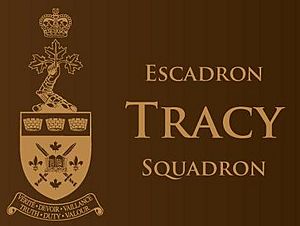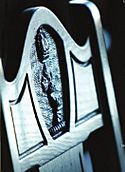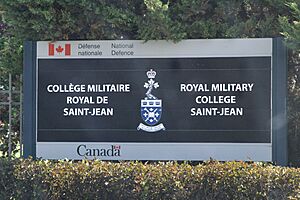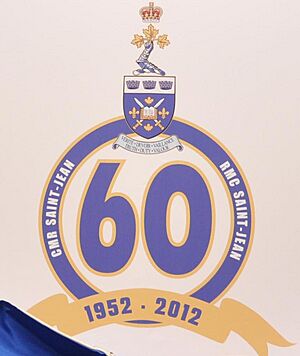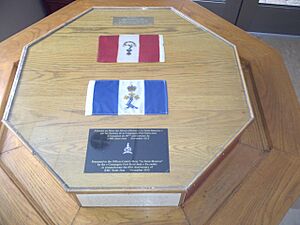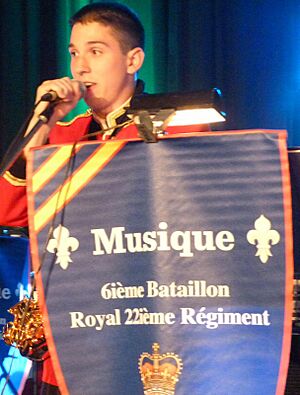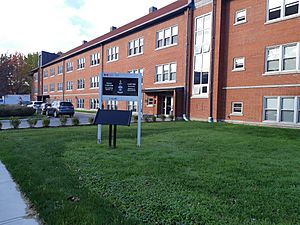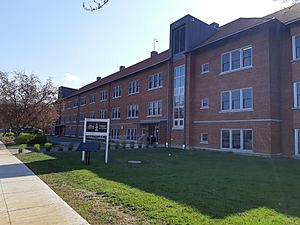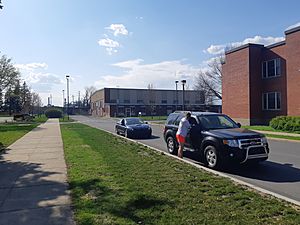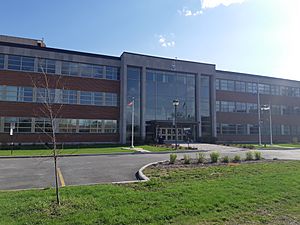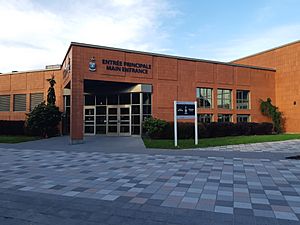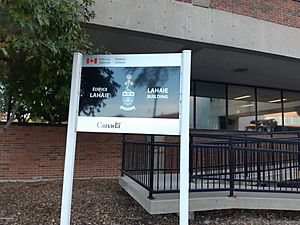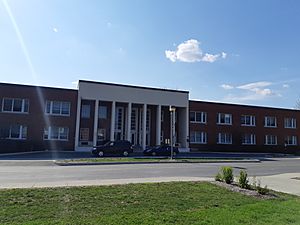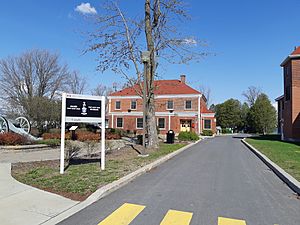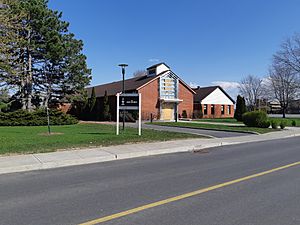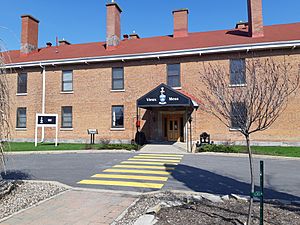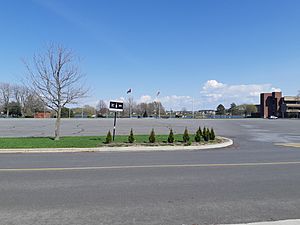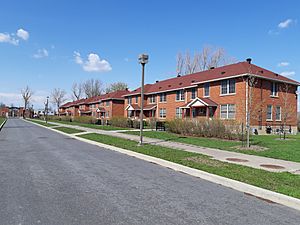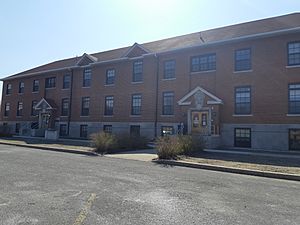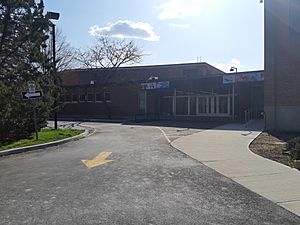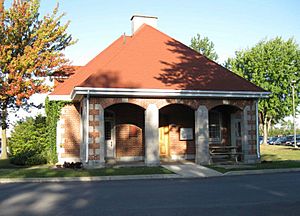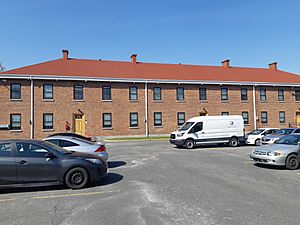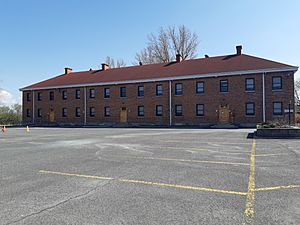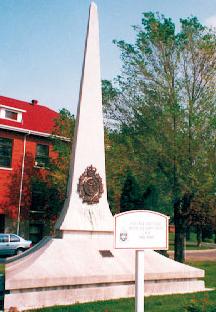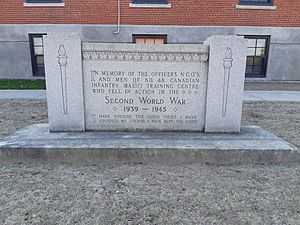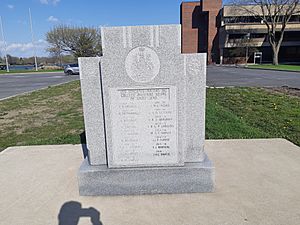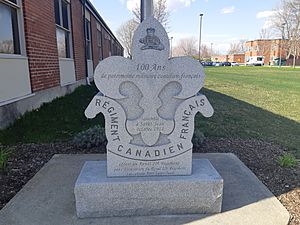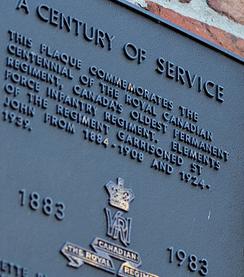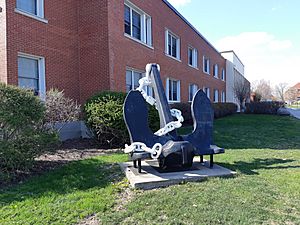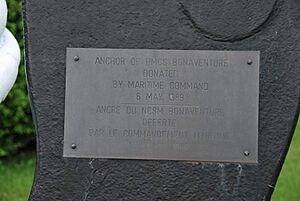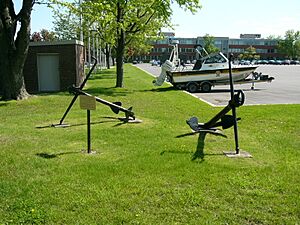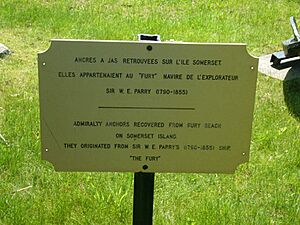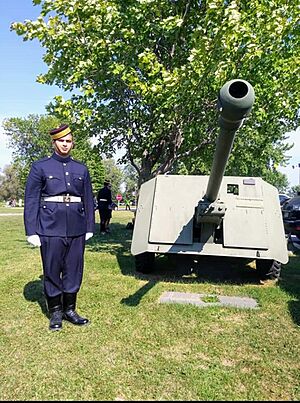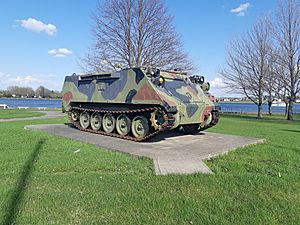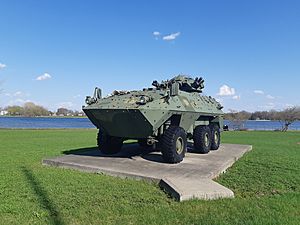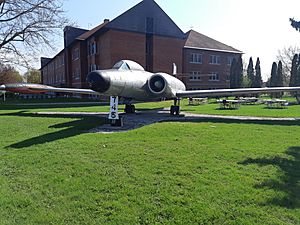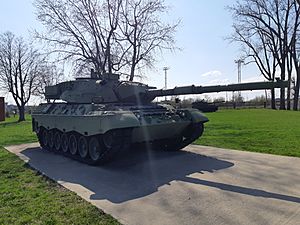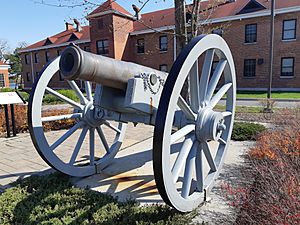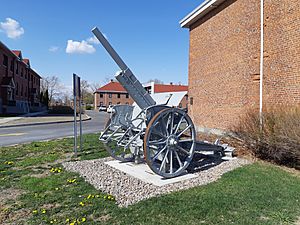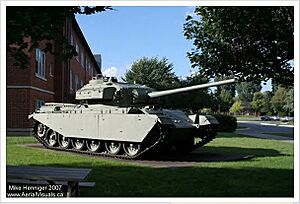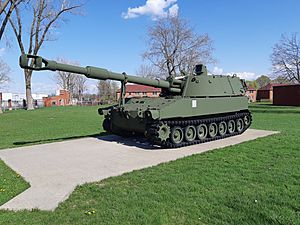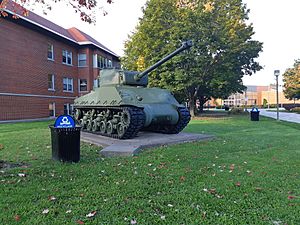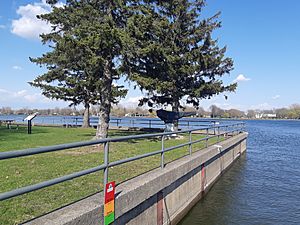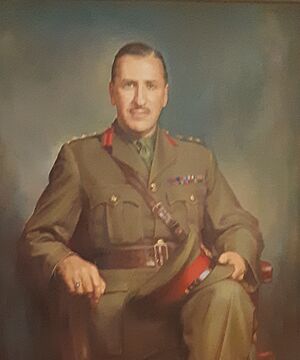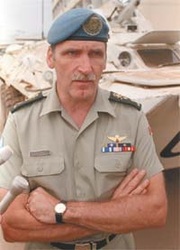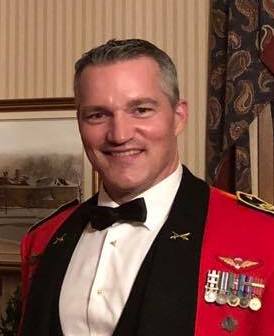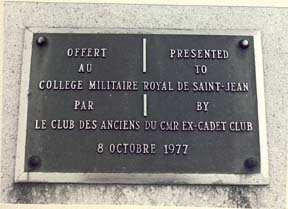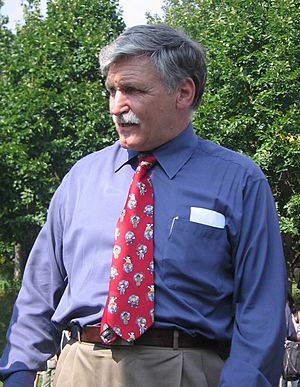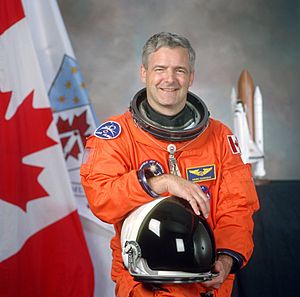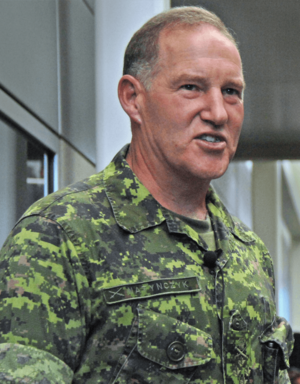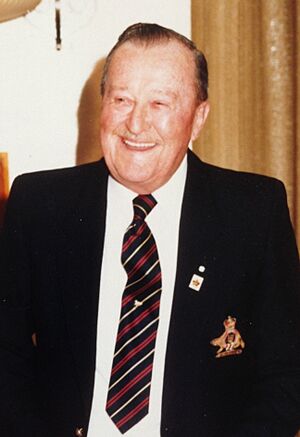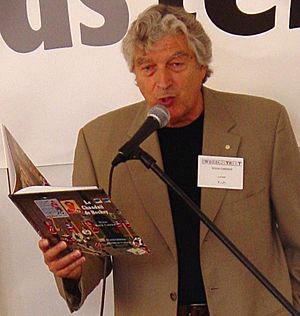Royal Military College Saint-Jean facts for kids
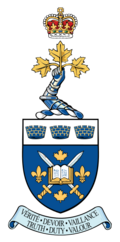
|
|
| Motto | French: Verité, Devoir, Vaillance |
|---|---|
|
Motto in English
|
Truth, Duty, Valour |
| Type | Military college |
| Established | 1952 |
| Chancellor | Bill Blair (ex officio as Defence Minister) |
| Commandant | Col Guillaume Tremblay |
|
Administrative staff
|
100 |
| Undergraduates | up to 150 |
| Location |
Saint-Jean-sur-Richelieu
,
,
Canada
45°17′49″N 73°15′09″W / 45.29694°N 73.25250°W ACoordinates: Extra unexpected parameters |
| Campus | 80 acres (32 ha), waterfront, situated on the west bank of the Richelieu River, Fort Saint-Jean (Quebec) |
| Affiliations | IAMA/AIAM, BCI, RSEQ, Cégep de Saint-Jean-sur-Richelieu |
 |
|
The Royal Military College Saint-Jean (French: Collège militaire royal de Saint-Jean), often called RMC Saint-Jean or CMR, is a Canadian military college and university. It is located at the historic Fort Saint-Jean in Saint-Jean-sur-Richelieu, Quebec. This town is about 40 kilometers south of Montreal. RMC Saint-Jean is part of the Canadian Military College (CMC) system. It offers college-level programs in Social Science and Science. These programs help students prepare for university studies at the Royal Military College of Canada in Kingston, Ontario. In 2021, RMC Saint-Jean gained its own university status. It now offers a bachelor's degree in International Studies.
Contents
- What RMC Saint-Jean Does
- Programs for Students
- Officer Training Program
- Uniforms at RMC Saint-Jean
- Leadership Roles for Cadets
- Awards for Cadets
- Cadet Squadrons
- Daily Life at RMC Saint-Jean
- History of RMC Saint-Jean
- Buildings and Features
- College Commandants
- Notable People and Hall of Fame
- Coat of Arms and Flag
- Books About RMC Saint-Jean
- See Also
What RMC Saint-Jean Does
- It provides pre-university and university programs.
- It offers military and fitness training.
- It helps students become fluent in both English and French.
Programs for Students
The programs at RMC Saint-Jean are for students who have finished high school in Quebec or other parts of Canada. These programs get students ready for university studies. They can either go to the Royal Military College of Canada in Kingston, Ontario, or stay at RMC Saint-Jean for its International Studies program.
Military education for Canadian officers focuses on four main areas:
- Military skills
- Physical fitness
- Being bilingual (speaking two languages)
- Academics (school studies)
About 345 students train at RMC Saint-Jean each year. They are in two-year pre-university programs that lead to a college diploma. Some are also in the International Studies program, which leads to a bachelor's degree.
- 110–120 cadets are in the Preparatory Year.
- 110–120 are in First Year.
- 25–50 are in Second Year.
- 25–40 are in Third Year.
- 25–35 are in Fourth Year.
Sometimes, students from Quebec who have already completed a year of college can start directly in the First Year.
Students choose either the Social Science program (for arts degrees) or the Science program (for engineering or science degrees). Both programs are offered in English and French. They share core courses like literature, philosophy, second language, and physical education. Other courses are specific to each program.
The school year has two semesters. It includes 150 teaching days and a final exam period. There is also a time for extra exams if needed.
Academic Subjects
| Science | Social Sciences |
|---|---|
|
Core courses for both programs include literature, humanities, a second language, and physical education. The first year helps students develop good study habits, work hard, think critically, and work well in teams.
Officer Training Program
Students at RMC Saint-Jean can join the Regular Officer Training Program (ROTP). This program helps future officers get a bachelor's degree. A degree is needed to become an officer in the Canadian Armed Forces. Students can attend RMC Saint-Jean or the Royal Military College of Canada in Kingston. For some degrees, students can attend a civilian university if the military colleges don't offer that specific program.
Uniforms at RMC Saint-Jean
Officer and Naval cadets wear different uniforms for various events. These include ceremonial dress, full dress for formal events, and uniforms for sports or combat.
Since 2009, cadets have worn a special daily uniform. It includes a white shirt, black sweater or light jacket, and black pants or skirt with a red stripe. They also wear a black wedge-shaped hat with red trim.
For very formal dinners, they wear a special uniform called Mess dress.
Leadership Roles for Cadets
To improve their leadership skills, cadets are given positions of responsibility. These roles are based on their performance or to help them develop. Each cadet wears 1 to 5 bars to show their level of authority. A position usually lasts for one semester.
| Position | What they do | Bars |
|---|---|---|
| CSL/COMO | The Cadet Squadron Leader manages a group of about 75 cadets. | 4 |
| CSTO/INSTRO | The Cadet Squadron Training Officer makes sure cadets follow rules. They also check their behavior, dress, and manners. | 3 |
| CFL/COMI | The Cadet Flight Leader is in charge of one of two smaller groups (flights) within a squadron, usually about 30 cadets. | 3 |
| DCFL/ACOMI | The Deputy Cadet Flight Leader helps the CFL. They also ensure cadets in their flight follow rules and behave well. | 2 |
| COMSEC | The Section Commander is in charge of one of three sections within a flight, usually about 10 cadets. | 2 |
| DCOMSEC/ACOMSEC | The Deputy Section Commander helps the COMSEC. They also ensure cadets in their section follow rules and behave well. | 1 |
Awards for Cadets
Awards are given to cadets who perform very well.
| Award Name | What it's for |
|---|---|
| Royal Military College Saint-Jean Sword of Honour | Awarded to the second-year cadet with the best overall performance in all four areas of the college program. |
| John Matheson Memorial Sword | Given to the Preparatory Year cadet with the highest results in academics, leadership, athletics, and bilingualism. |
| Ex-Cadets Trophy | Awarded to the First Year cadet with the highest results in academics, leadership, athletics, and bilingualism. |
| Navy Bowl Trophy | Awarded to the winning team of the Drill Competition. |
| General Tremblay Trophy | Given to the squadron with the best performance in military training. |
| The Alumni Honorary Trophy | Awarded to the graduating cadet chosen by their peers for being the most helpful and improving college life. |
| Harold Feldman Memorial Trophy | Awarded to the squadron with the best performance in sports. |
| Governor General's Collegiate Bronze Medal | Given to the First Year cadet with the highest academic average in any program. |
| Montreal Branch Trophy | Awarded to the Preparatory Year and First Year cadets with the best academic average across all programs. |
| CWO Beaudoin Colour Party Trophy | Awarded to the winning team of the Colour Party Competition. |
| Class of 1978 Trophy | Given to the squadron with the best performance in all activities during the school year. |
| Commandant's Trophy | Awarded to the best squadron in the Obstacle Course. |
| Director of Cadets Trophy | Awarded to the best team in the Obstacle Course. |
| The Gazelle Trophy | Given to the cadet who helped their squadron the most during the Obstacle Course. |
| General Sir Richard Turner V.C. Trophy | Awarded to the cadet with the highest overall skills for the academic year. |
| P.J.M. Morin Trophy | Awarded to the best overall First Year cadet. |
| Best CMC Plaque | Given to the cadet with the highest score in the Physical Fitness Test. |
| Most Improved CMC Plaque | Awarded to the cadet who showed the most improvement in the Physical Fitness Test. |
| The Class of 1957 Awards | Four awards for cadets who showed the most improvement and overall excellence in their second language (English and French). |
| The Maisonneuve Bursaries and Shield | Awarded to the two First Year cadets with the highest academic averages in Social Sciences and Sciences. |
| The Literature Excellence Award | Given to the cadet who performs best in English or French literature. |
| The Yanjing Rosetta Lu Award | Awarded to the Second Year cadet with the highest academic average. |
| The Excellence award in University studies | Awarded to the Third Year cadet with the highest academic average. |
| The Pierre Laviolette Bursary | Awarded to the Fourth Year cadet with the highest academic average. |
| The Jean Trophy | Given to the cadet who had the biggest positive impact on college life and culture. |
| The Caisse Desjardins du Haut-Richelieu | Two awards: one for the cadet with the most determination and perseverance, and one for the cadet with the most academic improvement. |
| Class of 2022 Trophy | Awarded to the winning squadron of the 4th Year competition. |
Cadet Squadrons
The students, called the Cadet Wing, are divided into three groups called Squadrons. Senior cadets guide and supervise these squadrons. The squadrons are named after local communities, which in turn are named after important historical figures from New France. Squadrons are further divided into smaller groups called flights and sections. In 2017, a fourth squadron named Jolliet was added. These squadrons compete for the "Commandants Cup" in the four main areas of the college.
| Squadron # | Name | Historical figure |
|---|---|---|
| 1 | Richelieu | Cardinal Richelieu |
| 2 | Iberville | Pierre Le Moyne d'Iberville |
| 3 | Tracy | Alexandre de Prouville de Tracy |
| 4 | Jolliet | Louis Jolliet |
In the 1960s, the three squadrons were named Cartier, Maisonneuve, and Champlain. These names also honored historical figures.
Daily Life at RMC Saint-Jean
When new officer cadets arrive, they have already chosen their military service. They are then placed into one of the four squadrons: Richelieu, Iberville, Tracy, or Jolliet.
The pre-university program uses modern teaching methods. These include workshops, research introductions, labs, group projects, and presentations. Staff offer academic help through workshops, tutorials, and extra courses.
Cadets live in the Cartier or Champlain Buildings. They eat in the Dextraze Pavilion. Cadets cannot leave the campus except on weekends. However, some weekends are used for military training.
During the week, the daily routine includes inspections, running, breakfast, classes, sports, and study time. Cadets attend academic classes and receive military training. This training includes drills, map reading, compass use, and two large field exercises each year. Cadets can take on leadership roles like squadron leader or section commander. To promote bilingualism, there are special French and English weeks.
On weekends, cadets are mostly free, unless there is military training.
History of RMC Saint-Jean
In the fall of 2007, the Canadian government reopened the military college at Saint-Jean. The college was supposed to close in 1995. However, in 1994, the governments agreed to keep it open as a college that did not grant degrees.
The reopened RMC Saint-Jean is different from the original college, which opened in 1952. It is also different from the RMC in Kingston. The new RMC Saint-Jean includes the Canadian Forces Management and Development School. It is also home to the Chief Warrant Officer Robert Osside Profession of Arms Institute. This institute helps train future senior leaders of the Canadian Forces.
Michaëlle Jean, who was the Governor General of Canada, officially opened the Royal Military College Saint-Jean on May 24, 2008. She also presented the college's new coat of arms.
The Commandant of RMC Saint-Jean reports to the Commander of the Canadian Defence Academy (CDA). RMC Saint-Jean also has its own board of governors. Cadets at RMC Saint-Jean wear scarlet uniforms. The first-year program at RMC Saint-Jean helps make more space at RMC Kingston. This allows more cadets to attend RMC Kingston instead of civilian universities.
Key Moments in History
| Year | Important Event | |
|---|---|---|
| 1926 | Plaques were placed at Fort Saint-Jean. They describe its history, including being built in 1743 and rebuilt in 1773. | |
| 1948 | The Canadian Military Colleges Circle (CMC) was formed. It included RMC, Royal Roads Military College, and Collège militaire royal de Saint-Jean. | |
| 1952 | The Collège militaire royal de Saint-Jean (CMR) was created. Its goal was to train cadets from all three military services. It aimed to have more French Canadians in the Canadian Forces. The Governor General of Canada officially opened the CMR. | |
| 1968 | Pavillon Lahaie was built. It has labs, a library, and offices. | |
| 1971 | CMR partnered with the Université de Sherbrooke. This allowed cadets to earn a bachelor's degree without leaving Saint-Jean. | |
| 1973 | The college's official march, "La marche du Richelieu," became official. | |
| 1977 | The College was given the "Freedom of the City." This is an honor given by a city. | |
| 1985 | The Quebec government allowed CMR to grant its own university degrees. | |
| 1988 | CMR was allowed to grant master's and doctorate degrees. | |
| 1995 | Due to government budget cuts, the Department of National Defence closed Royal Roads Military College and Collège militaire royal de Saint-Jean. | |
| 2007 | The reopening of CMR was announced for the fall term. | |
| 2008 | Michaëlle Jean, Governor General of Canada, officially opened the Royal Military College Saint-Jean. | |
| 2012 | Royal Military College Saint-Jean celebrated its 60th anniversary. | |
| 2017 | The Chief Warrant Officer Robert-Osside Profession of Arms Institute was developed. | |
| 2018 | RMC Saint-Jean started offering university degrees again in International Studies. | |
| 2020 | The academic year was cut short due to the COVID-19 pandemic. Cadets continued studies online. | |
| 2021 | The first class since 1995 graduated. 12 cadets earned a Bachelor of Arts degree. |
Buildings and Features
Cadets live in the Cartier and Champlain Blocks. Other buildings like Vanier, DeLéry, Dextraze, Lahaie, and Massey Pavilions are shared. The campus offers technology support, including a library, labs, and internet access. The buildings are also used by the Canadian Forces and a non-profit group called Campus du Fort Saint-Jean (Quebec). This group helps maintain the facilities and rents them out for events.
Six buildings on the RMC Saint-Jean grounds are recognized as Federal Heritage Buildings:
| Building | Built | What it's known for | Photo |
|---|---|---|---|
| Cartier Pavilion | 1955 | Named after Jacques Cartier, a French explorer. It is a residence for students. | |
| Champlain Pavilion | 1953 | A residence for students. | |
| CWO Couture Building 16 | 2012 | A drill hall named after Chief Warrant Officer Couture. | |
| DeLery Building | 1957 | Has classrooms and offices. Named after Gaspard-Joseph Chaussegros de Léry, who built Fort Saint-Jean in 1748. | |
| Dextraze Pavilion | 1992 | A dining room named after General J.A. Dextraze, a former Chief of the Defence Staff. | |
| Lahaie Pavilion | 1968–74 | Has the library, labs, and offices. Named after Brigadier General Marcelin L. Lahaie, the first commandant. | |
| Maisonneuve pavilion | 1953 | A dormitory named after Paul de Chomedey de Maisonneuve, who founded Montreal. | |
| Massey Building Musée Fort-Saint-Jean Pavillon Les Forges | 1937 | Named after Vincent Massey, a former Governor General of Canada. It houses the Fort Saint-Jean Museum. | |
| Officer Cadet Mess, Mess Saint-Maurice building | 1956 | The cadets' dining hall, named after Saint Maurice. | |
| Vieux Mess building | 1839 | Used for special events and dinners. | |
| Parade square | 1955 | A large open area for parades and drills. | |
| Private Married Quarters (PMQ) | bricks (1935), wood (1952) | Homes for military personnel and their families. | |
| Administration Building No. 24 (1937–38) | 1938 | A recognized Federal Heritage Building. | |
| Vanier Pavilion | 1957 | A sports complex with a gym, skating rink, and pool. Named after Georges P. Vanier, a former Governor General. | |
| Former Guardhouse and Museum, Building 26 | 1885 | Once served as a guardhouse and museum. | |
| Montcalm Barracks | 1839 | Named after General Louis-Joseph de Montcalm. Used as classrooms, then a dormitory. | |
| Gallisonnière Barracks | 1838 | Named after New France Governor Roland-Michel Barrin de La Galissonière. Used as classrooms, then a dormitory. |
Fort Saint-Jean Museum
| Established | 1965 |
|---|---|
| Location | Massey Building, Old Forge, on campus of Royal Military College Saint-Jean, Saint-Jean-sur-Richelieu Quebec |
The Fort Saint-Jean Museum is located on the college campus. Its job is to collect, keep, research, and show items related to the history of the college. It also covers the history of its former cadets and the Fort Saint-Jean site. The museum has collections of military items, maps, models, and historical objects. The site has been used by different military groups since 1666.
The museum is managed by the CMR Ex-Cadet Foundation. It highlights over 325 years of military history at the fort. The museum is open Wednesday to Sunday, from 10:00 AM to 5:00 PM, from May 24 to September 1.
Archaeology digs have happened on the site from 2009 to 2013. These digs are supported by the Canadian Forces, Laval University, and Parks Canada. The museum is part of several museum organizations.
Memorials and Plaques
There are several memorials and plaques on campus that honor important historical events and people.
| Memorial/Plaque | Description | Photo |
|---|---|---|
| 25th Anniversary Monument | Donated in 1977 to celebrate the college's 25th anniversary. Unveiled by Prime Minister Pierre Elliott Trudeau. | |
| Second World War Memorial | A granite slab from 1945 dedicated to those who died during the Second World War. | |
| Sergeant-Majors Plaque | A plaque on a granite slab dedicated to former Sergeant-Majors of the college. | |
| Royal 22e Régiment Memorial | A stone monument from 1964 to mark the 50th anniversary of the Royal 22e Régiment. | |
| R22R 100th anniversary Plaque | Marks the 100th anniversary of the Royal 22e Régiment (1914). | |
| A Century of Service | A plaque celebrating 100 years of the Royal Canadian Regiment (1883–1983). |
Military Vehicles and Anchors
Various military vehicles and naval anchors are displayed around the campus.
| Item | Description | Graphic |
|---|---|---|
| Air Defense Anti-Tank System (ADATS) | A type of anti-tank missile system, located near Dextraze pavilion. | |
| Anchor of HMCS Bonaventure | One of two anchors from HMCS Bonaventure, Canada's last aircraft carrier. Donated in 1998. | |
| Plaque on HMCS Bonaventure anchor | Describes the anchor's history and its connection to HMCS Bonaventure. | |
| Admiralty pattern anchors of HMS Fury | Anchors from HMS Fury, a ship abandoned in the Arctic in 1825. | |
| Plaque at HMS Fury anchors | Explains the history of the HMS Fury anchors. | |
| Ordnance QF 17-pounder | A 75mm anti-tank cannon used during the Second World War. | |
| AVGP M-130 | A Canadian armored personnel carrier, located near the parade square. | |
| AVGP Grizzly | Another Canadian armored personnel carrier, also near the parade square. | |
| Avro Canada CF-100 Canuck | A Canadian-designed jet aircraft from after 1952. | |
| Leopard 1 | A type of tank, located by staff residences. | |
| Canon-obusier | An English bronze cannon-howitzer made between 1841 and 1846. | |
| German Cannon | A German 77mm cannon from around 1916, a prize from the Great War. | |
| Centurion tank | A tank purchased by Canada in 1950 to replace older models. | |
| M109 howitzer M109A4 | A type of howitzer, located by staff residences. | |
| M4 Sherman tank | An American-made tank used by Canada during the Second World War. | |
| Naval signal cannon | A six-shot cannon from HMCS Mackenzie, used to signal the Navy's presence. It is used at graduations. |
College Commandants
The Commandant is the leader of the Royal Military College Saint-Jean. Here are some of the people who have held this important role:
| Name | Years Served | Key Facts | Photo |
|---|---|---|---|
| H11171 Colonel Marcelin L. Lahaie | 1952–1957 | First Commandant of RMC Saint-Jean. A building is named after him. | |
| H7860 Brigadier-General (ret'd) Senator Roméo Dallaire | 1989–1991 | A well-known Senator, educator, and author. | |
| 17312 Colonel M.A.J. (Jennie) Carignan | 2013–2015 | First woman in Canadian Forces history to command a combat unit in Afghanistan. | |
| 18087 Colonel Gervais Carpentier | 2017–2019 | During his time, RMC Saint-Jean started offering university programs again. | |
| 20830 Brigadier general Nicolas Joseph Jean-Louis Pilon | 2019–2021 | RMC Saint-Jean became a university again and had its first graduating class since 1995. |
Notable People and Hall of Fame
The Royal Military College Saint-Jean has a Hall of Fame, started in 2013. People are chosen if they studied, worked, or were significantly involved with the college since 1952.
Hall of Fame Members
| Name | Induction Year |
|---|---|
| Hon. Joseph A. Day, Senator | 2013 |
| General Walt Natynczyk | 2013 |
| Lieutenant general Richard J. Evraire | 2013 |
| Professor Jacques Castonguay, former RMC Saint-Jean Principal | 2013 |
| Lieutenant-general, Hon. Roméo Dallaire, Senator | 2013 |
| Lieutenant-general J.O. Michel Maisonneuve | 2022 |
| Major-General Lise Bourgon | 2022 |
| Commander Marc Garneau | 2023 |
| Lieutenant-Colonel (ret'd) Hal Klepak | 2024 |
Famous Alumni
Here are some well-known people who attended RMC Saint-Jean:
| Name | College Year | Achievements | Photo |
|---|---|---|---|
| Lieutenant-General Senator Roméo Dallaire | CMR RMC | Senator, former Commander of the UN Mission to Rwanda. | |
| Doctor Marc Garneau | CMR RMC 1970 | Canadian astronaut who spent nearly 700 hours in space. | |
| Steven MacLean | CMR 1973 | Canadian astronaut. | |
| General Walter Natynczyk | CMR RRMC 1979 | Former Chief of the Defence Staff. | |
| Colonel Jean Berthiaume | CMR 1952 | First Administrative Director at the CMR. | |
| Lieutenant-general Jennie Carignan | CMR 1990 | First female general from a combat role. | |
| Brigadier General Gervais Carpentier | CMR 1992 | Senior military officer. | |
| Lieutenant-General William Charles Leach | CMR, RMC 1965 | Former Commander of the Canadian Army. | |
| Lieutenant-General Fred Sutherland | CMR, RMC 1965 | Former Vice Chief of the Defence Staff. |
Faculty
- Roch Carrier, a famous author.
- Janine Krieber, a professor.
Coat of Arms and Flag
The motto of RMC Saint-Jean is "Truth, Duty, Valour." This motto is used by all Canadian military colleges. The college's coat of arms and flag feature symbols like swords, an open book, maple leaves, and fleurs-de-lis.
Books About RMC Saint-Jean
Several books have been written about the Royal Military College Saint-Jean:
- H15198 Dr. Jacques Castonguay wrote "Pourquoi a-t-on fermé le Collège militaire de Saint-Jean?" (2005) and "Le Collège militaire royal de Saint-Jean" (1989).
- H16511 Dr. Richard A. Preston wrote "To Serve Canada: A History of the Royal Military College since the Second World War" (1991).
See Also
- Canadian Military Colleges
- Royal Military College of Canada
- Royal Roads Military College
- Royal Naval College of Canada
 | James B. Knighten |
 | Azellia White |
 | Willa Brown |




